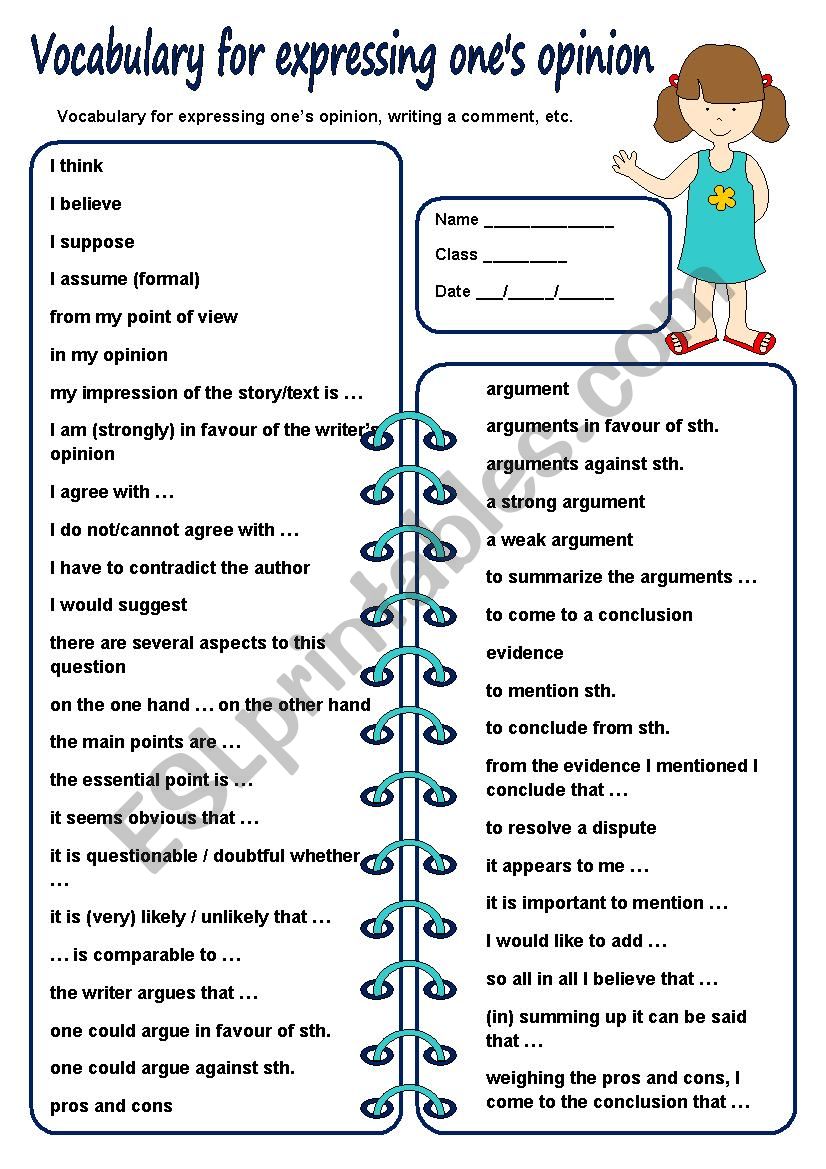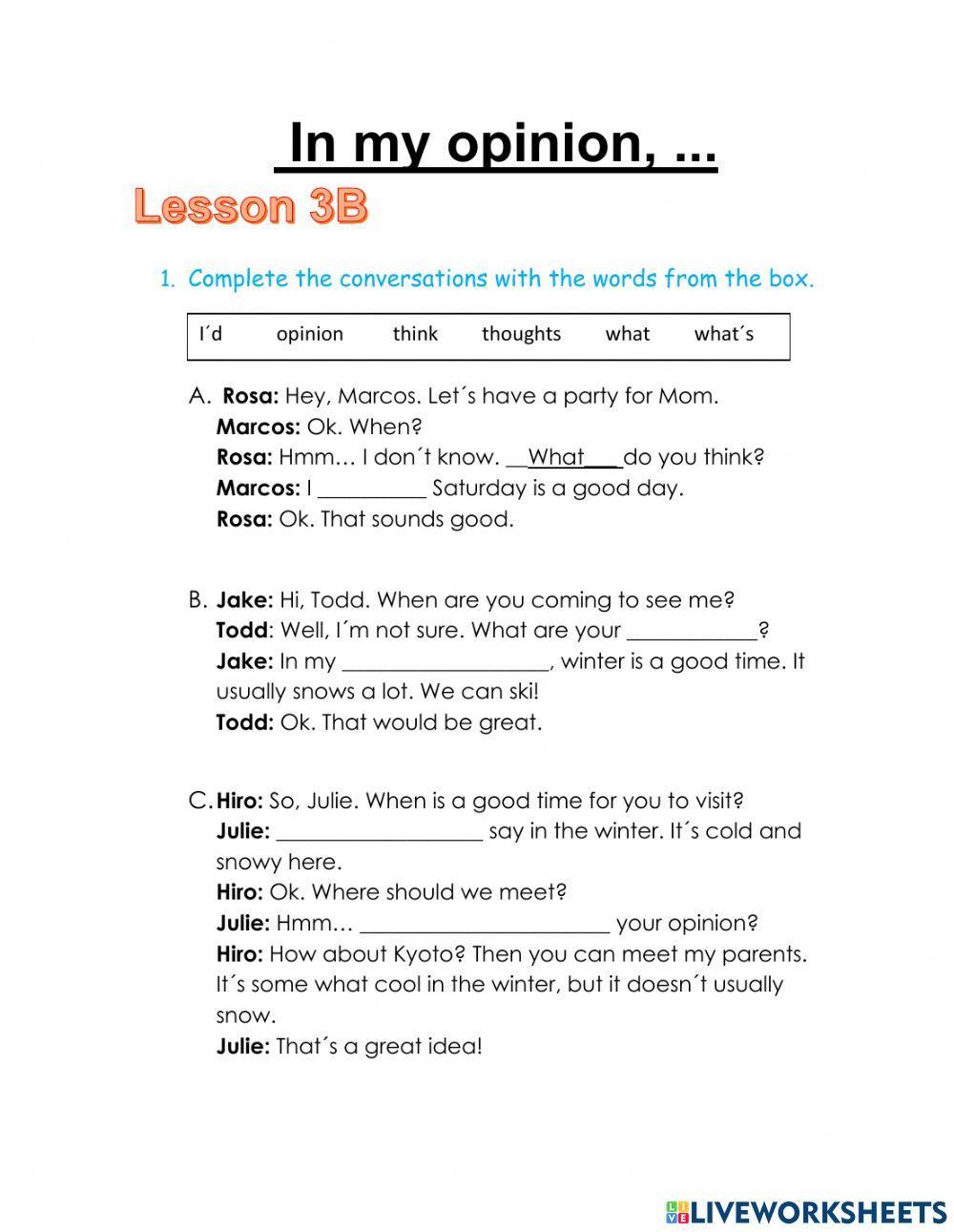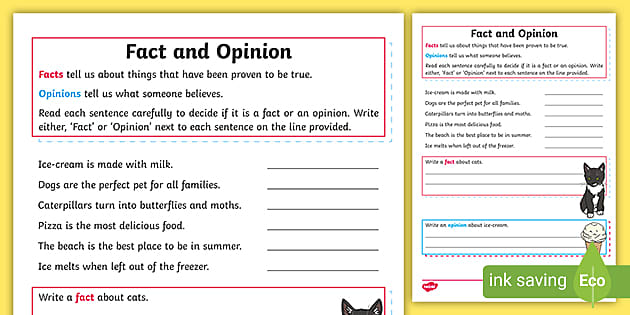
Mastering the Art of Expression: The Indispensable Role of Opinion Vocabulary Worksheets
In an increasingly interconnected world, the ability to articulate one’s thoughts, beliefs, and perspectives clearly and persuasively is paramount. Whether in academic discourse, professional settings, or everyday conversations, expressing an opinion effectively goes beyond simply stating "I think." It requires a nuanced understanding of language, the ability to qualify statements, express degrees of certainty, and engage in constructive dialogue. This is precisely where Opinion Vocabulary Worksheets emerge as an invaluable tool for language learners and educators alike. These specialized worksheets provide a structured and systematic approach to acquiring the linguistic arsenal needed to navigate complex discussions and present arguments with confidence and precision.
This comprehensive article will delve into the profound importance of opinion vocabulary, explore the diverse types of Opinion Vocabulary Worksheets available, discuss their myriad benefits, and offer practical guidance on how to effectively create and integrate them into language learning curricula.

The Foundation of Expression: Why Opinion Vocabulary Matters

Before delving into the specifics of worksheets, it’s crucial to understand why a rich opinion vocabulary is so vital. At its core, opinion vocabulary empowers individuals to:

- Enhance Clarity and Precision: Instead of generic phrases like "I think," learners can use "I contend," "I firmly believe," or "It appears to me that," conveying a specific degree of conviction or doubt.
- Promote Critical Thinking: The act of choosing the most appropriate word to express an opinion forces learners to analyze their thoughts more deeply, considering nuances and implications.
- Facilitate Productive Discussion: When participants in a discussion can articulate their agreements, disagreements, qualifications, and concessions with varied vocabulary, debates become more sophisticated and less confrontational.
- Improve Academic and Professional Writing: Essays, reports, presentations, and even emails often require the expression of well-reasoned opinions. A strong vocabulary allows for more sophisticated argumentation and analytical depth.
- Boost Confidence: Knowing one has the right words at their disposal reduces anxiety and encourages participation in discussions and public speaking.



Without targeted instruction in this area, learners often resort to repetitive, simplistic language that fails to capture the complexity of their thoughts, hindering both their communication and their intellectual development.
What Are Opinion Vocabulary Worksheets?

Opinion Vocabulary Worksheets are educational resources specifically designed to teach and reinforce the words, phrases, and expressions used to state, support, qualify, agree with, or disagree with opinions. They move beyond mere word lists by providing contextualized practice that helps learners understand when and how to use these expressions effectively.
These worksheets typically categorize vocabulary into functional groups, such as:

- Introducing an opinion: In my opinion, I believe, I feel, It seems to me, From my perspective, As far as I’m concerned.
- Expressing strong agreement: I completely agree, I couldn’t agree more, That’s exactly how I feel, Absolutely, You’ve hit the nail on the head.
- Expressing partial agreement: I agree up to a point, I see your point, but…, That’s true, however…, I can see why you’d say that.
- Expressing disagreement: I disagree, I’m afraid I don’t agree, I beg to differ, On the contrary, I don’t see it that way.
- Qualifying an opinion/Adding conditions: Unless, Provided that, As long as, In certain circumstances, To some extent.
- Expressing certainty/uncertainty: Undoubtedly, Definitely, It’s undeniable, Probably, Possibly, It’s highly unlikely.
- Giving reasons/supporting arguments: Because, Since, As a result, Consequently, Therefore, For instance, To illustrate.
- Concluding an opinion: In conclusion, To sum up, All in all, Ultimately.

By organizing vocabulary this way, learners can build a functional understanding of how these expressions contribute to the overall flow and coherence of an argument.
The Undeniable Benefits of Utilizing Opinion Vocabulary Worksheets
The systematic use of Opinion Vocabulary Worksheets offers a multitude of benefits for language learners across various proficiency levels:
- Structured Learning: Worksheets break down a complex linguistic area into manageable chunks, making the learning process less daunting and more effective. Learners can focus on one category of expressions at a time before integrating them.
- Contextualized Practice: Unlike rote memorization, worksheets present vocabulary in sentences, dialogues, or short passages, helping learners understand meaning and usage in real-world scenarios. This prevents common errors where learners know a word but use it inappropriately.
- Active Engagement: Many worksheets incorporate interactive exercises such as gap-fills, matching, sentence completion, and role-play prompts, which encourage active participation rather than passive reception of information. This active recall solidifies learning.
- Enhanced Fluency and Accuracy: Regular practice with these expressions leads to more automatic recall and accurate usage in both spoken and written communication. This reduces hesitation and improves the overall naturalness of expression.
- Preparation for Higher-Level Communication: For students preparing for standardized tests like IELTS, TOEFL, or Cambridge exams, opinion vocabulary is crucial for success in speaking and writing tasks that require argumentation and discussion. For professionals, it’s essential for meetings, negotiations, and presentations.
- Development of Critical Thinking Skills: By analyzing different ways to express the same opinion with varying degrees of force or nuance, learners develop a deeper understanding of the subtleties of language and thought. They learn to consider the impact of their word choices.
- Scaffolding for Complex Tasks: Worksheets can serve as a preparatory step for more challenging activities like debates, essays, or presentations. Learners can first master the individual expressions before attempting to weave them into longer, more complex pieces of communication.
Key Components and Types of Exercises in Opinion Vocabulary Worksheets
Effective opinion vocabulary worksheets incorporate a variety of exercise types to cater to different learning styles and reinforce vocabulary in diverse ways. Some common and highly effective exercise types include:
- Matching Exercises: Pairing opinion expressions with their definitions, synonyms, or categories (e.g., "agreement," "disagreement").
- Sentence Completion/Gap-Fill: Providing sentences with blanks where learners must insert the appropriate opinion vocabulary based on context.
- Multiple Choice: Choosing the best opinion expression from a list to fit a given sentence or scenario.
- Categorization/Sorting: Giving a list of opinion expressions and asking learners to sort them into categories like "strong agreement," "tentative disagreement," etc.
- Dialogue Completion/Creation: Providing incomplete dialogues where learners must add appropriate opinion expressions to make the conversation natural and coherent. Alternatively, asking learners to create short dialogues based on prompts.
- Opinion Scales: Presenting a statement and asking learners to mark their level of agreement/disagreement on a scale, then write sentences using appropriate vocabulary to explain their position.
- Debate Prompts: Providing controversial statements and asking learners to write or discuss their opinions, explicitly requiring the use of target vocabulary.
- Rephrasing Exercises: Asking learners to rephrase a simple opinion statement using more sophisticated opinion vocabulary. (e.g., "I think it’s a good idea" -> "I am inclined to believe that it’s a sound proposition.")
- Error Correction: Presenting sentences with incorrect usage of opinion vocabulary and asking learners to identify and correct the mistakes.
The best worksheets combine several of these exercise types to ensure comprehensive practice and prevent monotony.
Crafting and Integrating Effective Opinion Vocabulary Worksheets
For educators and self-learners, creating and utilizing effective opinion vocabulary worksheets requires thoughtful consideration:
- Target Audience and Level: Ensure the vocabulary and complexity of exercises are appropriate for the learners’ current proficiency level (e.g., A2, B1, C1). Start with simpler expressions before moving to more nuanced ones.
- Authentic Contexts: Present vocabulary within realistic scenarios, news headlines, social media discussions, or academic debates. This makes the learning more relevant and memorable.
- Variety is Key: Don’t rely on just one type of exercise. Mix and match matching, gap-fills, and productive tasks (writing/speaking prompts) to engage different skills.
- Clear Instructions: Ensure that instructions for each exercise are unambiguous and easy to follow.
- Answer Keys: Provide clear answer keys for self-correction and teacher grading.
- Engaging Topics: Choose topics for opinion expression that are relevant, interesting, and potentially debatable for the learners. This fosters genuine engagement and motivation.
- Scaffolding: For complex tasks, break them down. For example, before a debate, learners could complete a worksheet on expressing disagreement, then another on supporting arguments.
- Integration with Productive Skills: The ultimate goal is to use this vocabulary in real communication. After completing a worksheet, encourage learners to use the new expressions in speaking activities (discussions, debates, presentations) and writing tasks (essays, opinion pieces).
- Feedback and Correction: Provide constructive feedback on usage, not just on correctness. Help learners understand the subtle differences in meaning and connotation between similar expressions.
Beyond the Worksheet: A Holistic Approach
While opinion vocabulary worksheets are incredibly effective, they are most powerful when integrated into a broader language learning strategy. Encourage learners to:
- Read widely: Pay attention to how authors express opinions in articles, editorials, and academic texts.
- Listen actively: Notice opinion expressions in podcasts, news broadcasts, and debates.
- Engage in discussions: Seek opportunities to articulate their views in English.
- Keep a vocabulary journal: Record new opinion expressions with example sentences.
Conclusion
In conclusion, the ability to express opinions effectively is a cornerstone of advanced language proficiency and critical thinking. Opinion Vocabulary Worksheets serve as an essential and highly effective tool in developing this crucial skill. By providing structured, contextualized, and engaging practice, these worksheets empower learners to move beyond simplistic language, articulate their thoughts with precision and nuance, and participate confidently in any discussion or debate. Investing time in creating and utilizing these valuable resources will undoubtedly pave the way for more sophisticated, articulate, and impactful communication for all language learners.
